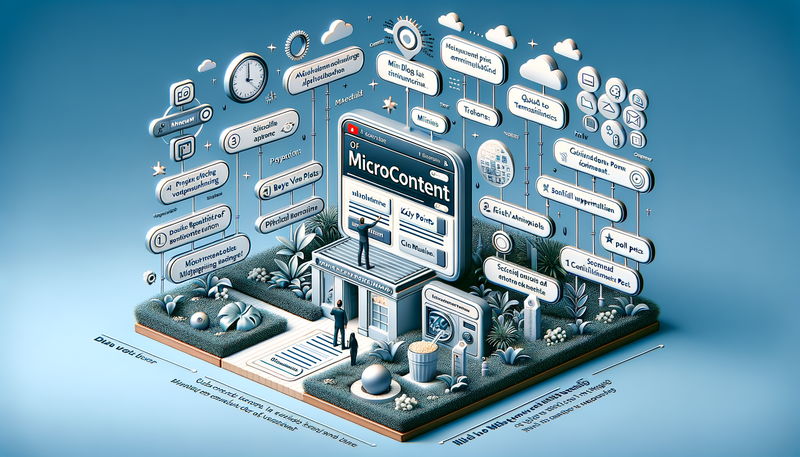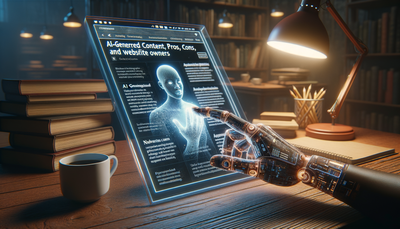10 Ways to Use Microcontent to Enhance Your Website's User Experience
Microcontent is a powerful tool that can significantly enhance your website's user experience. These small, focused pieces of content serve as signposts, guiding visitors through your site and making information more digestible. From headlines and subheadings to tooltips and pull quotes, microcontent plays a crucial role in improving usability, engagement, and overall user satisfaction. This article explores ten effective ways to leverage microcontent on your website, providing practical tips for creation and implementation. By mastering the art of microcontent, you can create a more intuitive, user-friendly website that keeps visitors engaged and coming back for more.Table of Contents:
-
1. Craft Compelling Headlines
- 2. Utilize Subheadings for Easy Scanning
- 3. Implement Descriptive Button Text
- 4. Enhance Navigation with Descriptive Link Text
- 5. Utilize Tooltips for Additional Information
- 6. Implement Breadcrumb Navigation
- 7. Create Informative Form Labels and Placeholders
- 8. Utilize Pull Quotes for Emphasis
- 9. Implement Microcopy for User Guidance
- 10. Optimize Meta Descriptions and Title Tags
- 2. Utilize Subheadings for Easy Scanning
- 3. Implement Descriptive Button Text
- 4. Enhance Navigation with Descriptive Link Text
- 5. Utilize Tooltips for Additional Information
- 6. Implement Breadcrumb Navigation
- 7. Create Informative Form Labels and Placeholders
- 8. Utilize Pull Quotes for Emphasis
- 9. Implement Microcopy for User Guidance
- 10. Optimize Meta Descriptions and Title Tags

1. Craft Compelling Headlines
Headlines are often the first piece of microcontent users encounter on your website. They play a vital role in capturing attention and encouraging further exploration. To create effective headlines:• Keep them concise and clear, typically under 70 characters
• Use action words to create a sense of urgency
• Incorporate relevant keywords for SEO benefits
• Ensure they accurately represent the content that follows
By crafting compelling headlines, you can immediately engage visitors and guide them to the information they seek, improving overall user experience and reducing bounce rates.
Do you need a website? Want to build a website but don't know where to start? Our website builder is the perfect solution. Easy to use, and with the ability to customize to fit your business needs, you can have a professional website in no time.
2. Utilize Subheadings for Easy Scanning
Subheadings break up large blocks of text, making content more scannable and digestible. They act as mini-headlines, guiding readers through your content and helping them find relevant information quickly. To effectively use subheadings:• Make them descriptive and informative
• Use a consistent hierarchy (H2, H3, etc.) for clear organization
• Incorporate keywords naturally for SEO benefits
• Ensure they provide a clear overview of the following content
Well-crafted subheadings improve readability and help users navigate your content more efficiently, enhancing their overall experience on your website.
3. Implement Descriptive Button Text
Buttons are crucial interactive elements on your website. The text on these buttons, known as call-to-action (CTA) microcontent, can significantly impact user engagement. To create effective button text:• Use action-oriented language (e.g., 'Get Started' instead of 'Submit')
• Keep it concise and clear
• Ensure it accurately describes the action that will occur
• Consider using first-person pronouns for a more personal touch
By implementing descriptive and compelling button text, you can increase click-through rates and guide users more effectively through your desired conversion paths.
Building a website with SITE123 is easy
4. Enhance Navigation with Descriptive Link Text
Link text, or anchor text, is a crucial form of microcontent that helps users navigate your website and understand where a link will take them. To optimize your link text:• Make it descriptive and relevant to the linked content
• Avoid generic phrases like 'click here' or 'read more'
• Keep it concise while still being informative
• Ensure it stands out visually from surrounding text
By using clear and descriptive link text, you can improve your website's usability, making it easier for users to find the information they need and navigate your site more efficiently.
5. Utilize Tooltips for Additional Information
Tooltips are small pop-up boxes that appear when a user hovers over or clicks on an element, providing additional information without cluttering the main interface. To effectively use tooltips:• Keep the content brief and to the point
• Use them to explain complex terms or provide additional context
• Ensure they're easily discoverable (e.g., through hover effects)
• Make them dismissible to avoid frustrating users
Tooltips can significantly enhance user experience by providing just-in-time information, reducing confusion, and streamlining the user interface.
6. Implement Breadcrumb Navigation
Breadcrumb navigation is a type of secondary navigation scheme that shows a user's location in a website or web application. To effectively implement breadcrumbs:• Use clear and concise labels
• Ensure they accurately reflect the site's hierarchy
• Make them clickable for easy navigation
• Consider using icons or separators for visual clarity
Breadcrumbs enhance user experience by providing context, improving navigation, and reducing the number of actions a user needs to take to get to higher-level pages.
7. Create Informative Form Labels and Placeholders
Form labels and placeholders are crucial microcontent elements that guide users through the process of inputting information. To optimize these elements:• Use clear, concise language for labels
• Provide helpful examples or formatting instructions in placeholders
• Ensure labels are visually associated with their corresponding fields
• Consider using inline validation messages for immediate feedback
By creating informative form labels and placeholders, you can reduce user errors, streamline the form-filling process, and improve overall conversion rates.
8. Utilize Pull Quotes for Emphasis
Pull quotes are short excerpts from the main content, typically displayed in a larger or distinct font. They serve to emphasize key points and break up large blocks of text. To effectively use pull quotes:• Choose impactful, standalone statements
• Keep them brief, ideally under 40 words
• Ensure they accurately represent the surrounding content
• Use consistent styling to make them stand out
Pull quotes can enhance user experience by highlighting important information, making content more scannable, and adding visual interest to your pages.
9. Implement Microcopy for User Guidance
Microcopy refers to small pieces of text that guide users through an interface or process. This can include error messages, instructional text, or confirmations. To create effective microcopy:• Use clear, concise language
• Maintain a consistent tone that aligns with your brand voice
• Provide specific, actionable guidance
• Consider the user's emotional state, especially for error messages
Well-crafted microcopy can significantly improve user experience by reducing confusion, preventing errors, and making interactions with your website more smooth and intuitive.
10. Optimize Meta Descriptions and Title Tags
While not directly visible on your website, meta descriptions and title tags are crucial microcontent elements that appear in search engine results. To optimize these elements:• Keep meta descriptions under 155 characters
• Include relevant keywords naturally
• Make them compelling and accurately represent the page content
• Ensure title tags are under 60 characters and include your main keyword
By optimizing these elements, you can improve your website's visibility in search results and increase click-through rates, ultimately driving more traffic to your site and enhancing the overall user experience.





